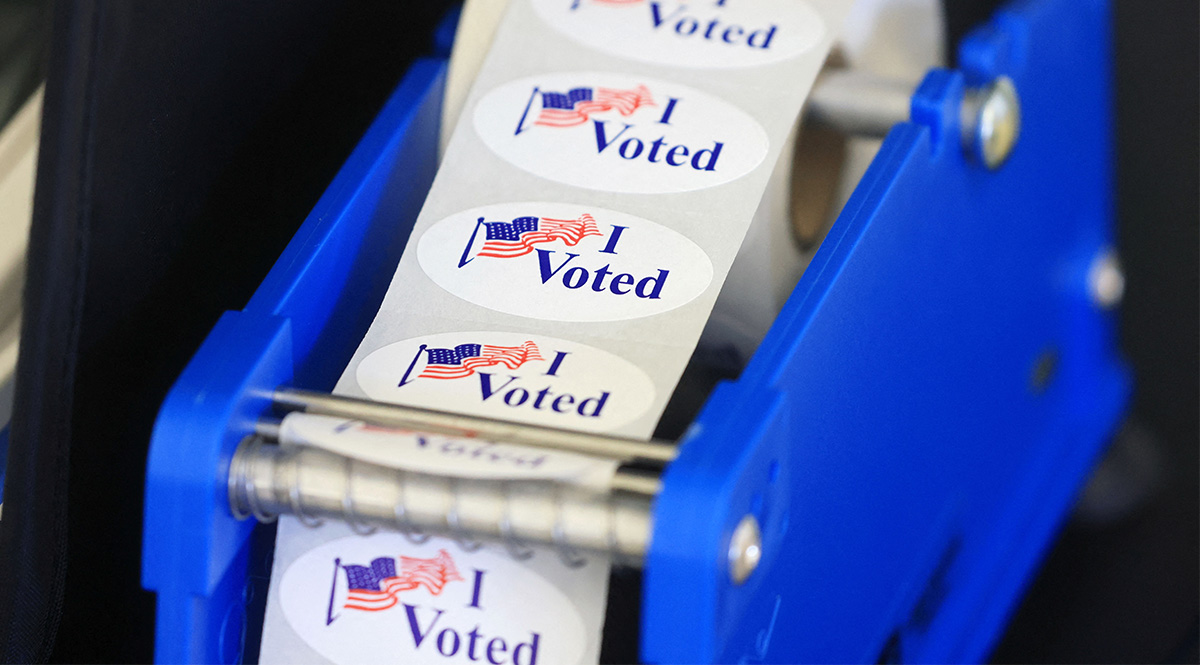Biden's State of the Union Address in an election year
On 7 March, U.S. President Joe Biden delivered the State of the Union address before a joint Congress. Although constitutionally it is not necessary to deliver it annually, it is tradition, and this was Biden’s third such speech and one in which he used for his re-election, focusing on domestic policy achievements and threats to democracy at home and abroad. In his speech, the president tried to distinguish himself from Donald Trump, which was a clear signal of the beginning of their direct competition in the presidential campaign.
 SHAWN THEW / Reuters / Forum
SHAWN THEW / Reuters / Forum
What did Biden focus on in the State of the Union?
One of the main themes of the president’s address was the threat to democracy. Referring to Russia’s war with Ukraine, Biden likened his speech to the address delivered in January 1941 by President Franklin Delano Roosevelt before the U.S. joined World War II, which focused on threats to U.S. security and democracy abroad, signalling a shift away from American non-interventionism at the time. Biden also pointed to democracy in the U.S. as still under threat, as evidenced by Trump’s attempts to reverse the outcome of the 2020 presidential election and the Capitol riot on 6 January 2021. Among the key topics in domestic politics, the president pointed to the top achievements of his presidency, including huge investments in infrastructure and the development of research and production capabilities in semiconductor and microprocessor technologies. He also highlighted the improving economy, lower unemployment, and a greater emphasis on increasing manufacturing in the United States under his presidency. Among his accomplishments, Biden cited efforts to improve employment conditions for the working middle class, protect the health and welfare systems, lower drug prices, expand access to education, and combat tax avoidance by large corporations and billionaires.
What did Biden say in the context of Israel’s war with Hamas?
The subject of the war is important to Biden’s re-election chances. He faces criticism from the Arab-American minority and leftist, progressive voters opposed to Israel’s conduct of the war, citing insufficient U.S. pressure to stop Israeli forces from actions that result in heavy civilian casualties. In the address, the president said Israel should take greater responsibility for protecting civilians while conducting military operations in Gaza. Biden announced that he had instructed the U.S. Armed Forces to build a temporary port on the Gaza coast to allow humanitarian aid to be delivered faster and more efficiently than by land (through checkpoints under Israeli control) or airdrops. He also noted that U.S. soldiers will not conduct operations in the Gaza Strip itself. Biden said that the only long-term solution to the current situation is a two-state solution that allows Israel and Palestine to coexist.
What other elements of U.S. foreign and security policy has Biden focused on?
In his speech, Biden stated that Russia, an aggressor, will not stop in Ukraine, and called on Congress to ensure continued U.S. support. He reiterated that American soldiers will not take part in the war. He also stressed the importance of the expansion of NATO to include Finland and Sweden, both of which joined as a consequence of Russia’s full-scale war against Ukraine. Biden pointed to the administration’s steps taken for peace in the Middle East preceding the Hamas terrorist attack on Israel, regarding the conclusion of the so-called Abraham Accords with Israel by Arab states (and talks with Saudi Arabia). He pointed to U.S. measures taken to eliminate threats from Iranian-backed terrorist groups, such as the coalition to protect freedom of navigation and the bombing of Houthis in Yemen. Biden announced that in the face of further threats to American troops he would take further necessary measures to ensure their safety. In the context of the rivalry with China, Biden pointed to measures taken and planned regarding technological security, as well as the fight against the influx of Chinese-made fentanyl into the United States.
What is the significance of the message to the November election?
An appearance before a joint Congress is an opportunity for a president seeking re-election to reach the widest possible audience with his election message. With the rivalry in the primaries between the two parties effectively over and the presidential campaign now focused on direct competition between Biden and Trump, the incumbent president repeatedly referred in the address to the actions of his predecessor. Biden’s main criticism of Trump included the latter’s efforts to reverse the outcome of the 2020 elections and the belief in the threat to democracy posed by his rival’s candidacy, which will be one of the main themes of Biden's election campaign. The president called out Trump for his statement about not backing NATO allies not spending enough on defence and for encouraging Russia “to do whatever it wants”. Biden blamed the former president for seeking to tighten abortion laws (which happened in numerous states after a 2022 Supreme Court ruling led by Trump appointees) and current efforts by conservative groups to restrict access to in-vitro treatment. Biden also stated that Trump failed to deal with the COVID-19 pandemic by providing adequate medical and social care to the American public. The address was a clear prelude to the direct contest between the incumbent and former presidents, around which the long campaign ahead of this November’s elections will focus.
How did Republicans respond to the president’s speech?
Traditionally, the party in opposition to the president’s party presents a brief response to the State of the Union. The Republican response was presented by Senator Katie Britt of Alabama. She focused on what she described as threats to U.S. security associated with inadequate protection of the southern border, rise in illegal migration, and the influx of drugs linked to the activities of cartels from Latin American countries, pointing to these as weaknesses in Biden's policies. She linked reports of a rise in crime to slogans popular among Democratic Party voters in previous years of cutting police funding. She also said that Biden was powerlessness as president and this led to the threat to “European allies” from Russia and encouraged Hamas to attack Israel and the Houthis to attack U.S. forces in the Middle East. On the threat from China, she criticised the president for “campaigning on TikTok” despite a ban on the use of the app by federal government employees. The same criticism will dominate Trump’s and the Republican Party’s campaign messaging to voters and targeting Biden and the Democrats in the coming months.



